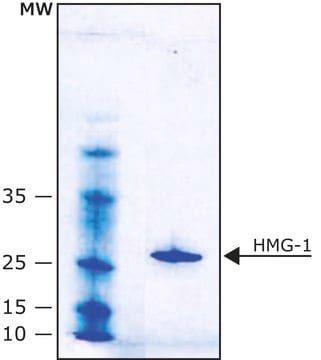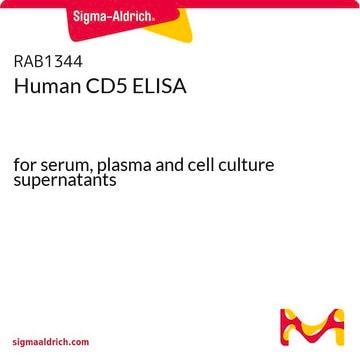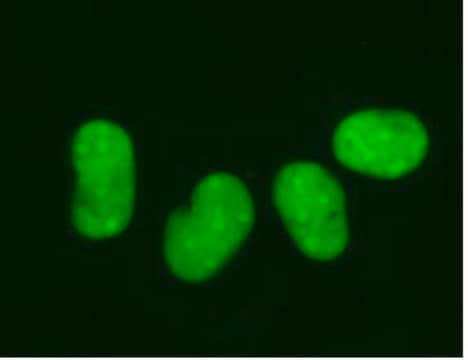Recommended Products
biological source
bovine (calf) thymus
Assay
≥85% (SDS-PAGE)
form
frozen liquid
mol wt
~24.9 kDa
packaging
pkg of 10 μg
storage condition
avoid repeated freeze/thaw cycles
concentration
900 μg/mL
technique(s)
membrane array: suitable
color
colorless to clear
NCBI accession no.
UniProt accession no.
shipped in
dry ice
storage temp.
−70°C
Gene Information
bovine ... HMG1() , HMGB1(282691)
Biochem/physiol Actions
High mobility group 1 (HMG1) is a 26 kDa highly conserved non-sequence-specific DNA-binding nuclear protein. Mammalian HMG1 has two homologous DNA-binding domains HMG boxes, A and B (each of 80–90 amino-acid residues), linked by a short basic region to an acidic C-terminal domain containing 30 consecutive Asp and Glu residues. HMG1 has been implicated in a number of fundamental biological processes including transcription, replication and recombination, in which it plays a role in manipulating DNA structure by bending, looping, compaction or unwinding, or by directly contacting with distinct cellular proteins. HMG-1 can act as a repressor, by interacting with TBP to block pre-initiation complex formation or as an activator, by facilitating the binding of various transcription factors to their cognate DNA sequences. Most recently, it was discovered that HMG-1 is a late mediator of delayed endotoxin lethality by activating downstream cytokine release.
Physical form
Clear and colorless frozen liquid solution
Preparation Note
Use a manual defrost freezer and avoid repeated freeze-thaw cycles. While working, please keep sample on ice.
Storage Class Code
10 - Combustible liquids
WGK
WGK 1
Flash Point(F)
Not applicable
Flash Point(C)
Not applicable
Certificates of Analysis (COA)
Search for Certificates of Analysis (COA) by entering the products Lot/Batch Number. Lot and Batch Numbers can be found on a product’s label following the words ‘Lot’ or ‘Batch’.
Already Own This Product?
Find documentation for the products that you have recently purchased in the Document Library.
M E Bianchi et al.
Science (New York, N.Y.), 243(4894 Pt 1), 1056-1059 (1989-02-24)
Cruciform DNA, a non-double helix form of DNA, can be generated as an intermediate in genetic recombination as well as from palindromic sequences under the effect of supercoiling. Eukaryotic cells are equipped with a DNA-binding protein that selectively recognizes cruciform
Cong Pang et al.
Brain sciences, 12(9) (2022-09-24)
Endogenous host-derived molecules named damage-associated molecular patterns (DAMPs) can induce excessive non-sterile inflammatory responses on recognition of specific membrane-tethered receptors. Here in this study, we aimed to explore the role of DAMP molecule HMGB1 in astrocyte-mediated sterile neuroinflammation and the
Structural features of the HMG chromosomal proteins and their genes.
M Bustin et al.
Biochimica et biophysica acta, 1049(3), 231-243 (1990-07-30)
V Zappavigna et al.
The EMBO journal, 15(18), 4981-4991 (1996-09-16)
High mobility group protein 1 (HMG1) is a non-histone, chromatin-associated nuclear protein with a proposed role in the regulation of eukaryotic gene expression. We show that HMG1 interacts with proteins encoded by the HOX gene family by establishing protein-protein contacts
Our team of scientists has experience in all areas of research including Life Science, Material Science, Chemical Synthesis, Chromatography, Analytical and many others.
Contact Technical Service








